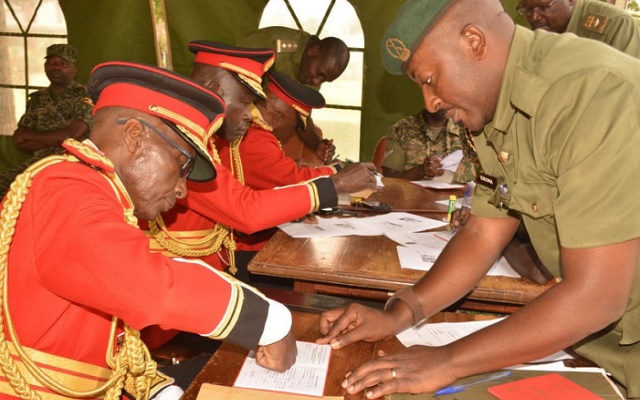
How former IGP’s mistakes are now back to haunt him
COVER STORY | IAN KATUSIIME | Back in 2015, there was a shoot-out at the home of former Inspector General of Government (IGG) Justice Faith Mwondha in Iganga district. Thugs had attacked Justice Mwondha’s home and on hearing the news, then Inspector General of Police Gen. Kale Kayihura rushed to the scene with the pomp and grandeur of his motorcade. Kayihura in his usual style reconnoitered the area, interviewed witnesses, and addressed journalists.
The incident was a snapshot of Kayihura’s policing model: big on tactical public displays and somewhat short on strategy. It never mattered to him that there was a District Police Commander or a Regional Police Commander whom he could consult, Kayihura revelled in the spotlight ostensibly fighting crime and to others, abetting it.
This defined his management style at the helm of the Police Force for twelve years. On Aug. 30, Kayihura will retire from the army. Even before he makes his final salute in army uniform, debate is raging on his record in another uniform: the Police.
Just a week before his retirement ceremony, Kayihura learnt that he was still being haunted by his legacy as IGP. On Aug. 22, the Constitutional Court in a unanimous verdict, upheld charges of torture filed against the former police chief and other senior officers. The case was filed in 2016, two years before he left his position.
Kayihura spent the last five years as a diminished figure having been sacked as IGP, arrested and arraigned on a string of charges in the General Court Martial. Kayihura’s retirement is a progression from his rehabilitation after he fell afoul of his boss, President Yoweri Museveni, amid accusations that as the most powerful security figure, he was advancing the interests of Rwanda with whom Uganda has an on-and-off relationship.
Kayihura served in the army for over 40 years since he joined the guerilla war waged by the National Resistance Army (NRA) in the 1980s against the Uganda National Liberation Front (UNLF) government of President Milton Obote.
He worked his way up through various positions where he caught the eye of his Commander-in-Chief and became his most trusted ally.
“Kale is the guy who still holds the original NRA spirit up to the present day,” says Jude Kagoro, a lecturer at Bremen University who worked with Kayihura to set up a police university. “He maintained those anti-colonial and anti-sectarian sentiments; they were ingrained in his mental state.”
He says Kayihura was able to become a successful officer partly because of keeping the Marxist orientation that they inherited in their bush war days that also focused on nation-building. Kayihura after his MA studies in the U.K., spent months training in Libya before joining the Luweero bush war.
“He was able to influence politics, attracted university students to join the police, grew the force budget, and created a political platform along his policing duties,” Kagoro says. He describes Kayihura as a hands-on man, always in the trenches and someone who was ideologically convinced.
“If there is someone who believes in Gen. Museveni, it is Gen. Kale,” Kagoro says.
He says that despite his political inclinations, Kayihura was able to build police presence through crime preventers; a strategy of community policing where police intended to spread its reach deep in villages.
“Because of that visibility, people saw it as a place to join and build a career including young graduates from well-to-do families,” Kagoro who has written about militarisation in Uganda, and Kayihura’s policing strategy.
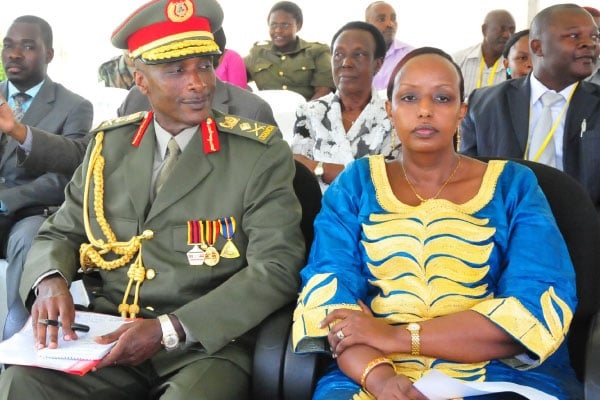
As a result, many young police commanders sprouted and became household names; Norman Musinga, Felix Kaweesi, Susan Kasingye, Moses Kafeero, Abbas Byakagaba, Siraje Bakaleke and James Ruhweza among others.
It was in the same backdrop that Kayihura started a Police university located in Bwebajja, Entebbe. “His idea was to build a critical mass and bolster command responsibility among a new cadre of intellectually refined police officers,” says Kagoro.
However, some of these commanders were implicated in gross human rights abuses alongside their boss as they turned their mission into cracking down on the political opposition led by Dr. Kizza Besigye. In Kayihura’s time, positions such as commander of Kampala Metropolitan Police, division police commanders and Director of Police Operations took on a whole new meaning.
Senior officers like Nixon Agasirwe, Commander Special Operations; and Senior Commissioner of Police Joel Aguma, were arrested and charged before the General Court Martial for allegedly repatriating Rwandan exiles the same charge that was slapped on Kayihura. Bakaleke at some point was being hunted by Interpol while facing charges of embezzlement, obtaining money with false pretence, conspiracy to defraud, and kidnapping.
Kayihura allied himself with rogue elements like Boda Boda 2010 which was known as a criminal gang in Kampala. For Kayihura, this was a way of quelling opposition protests but it came at a high price: the police neglected its cardinal duty of fighting crime to the periphery as it sought to fortify Museveni’s political capital.
In turn, Kayihura built a reputation for turning the Police into the NRM’s weapons division. Although it won him the favour of Museveni, it put him at odds with the opposition and public at large who felt Kayihura was serving political interests at the expense of fighting crime. He also faced criticism for stifling the Criminal Investigations Directorate, a critical arm of the force, in his reported war with CID director Grace Akullo.
His tenure also gave rise to high murder rates in Uganda. These include Sheikhs; Karim Ssentamu,
Abubaker Kiweewa, Mustafa Bahiga, Kadir Muwaya, businessman Kasiwukira, Assistant DPP Joan Kagezi, AIGP and Police spokesperson Felix Kaweesi.
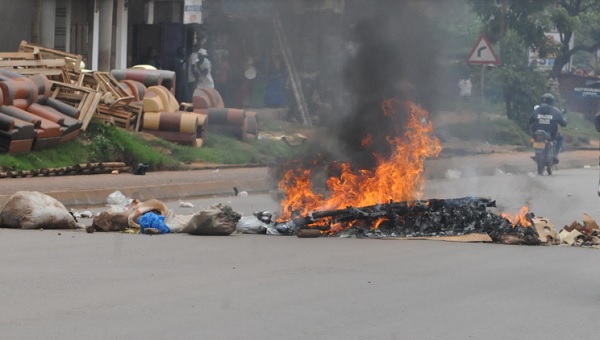
This trend peaked with the mysterious murder of women in Entebbe in 2017. Over 20 women were murdered in the areas of Katabi in a similar fashion; their bodies dumped in the middle of the night only to be discovered by onlookers. This coincided with the bijambiya group in Masaka that was slaughtering residents of the area in what was a bizarre wave of murders unseen before in the country.
At a press conference, one of the bijmbiya suspects who had been arrested told shocked journalists about their working relationship with the IGP.
Throughout his time as Police boss, Kayihura came under criticism for his policies and management of the Police from within. Julius Odwee, a former deputy IGP under him, was one of his biggest critics. Even after Odwee retired in 2011, he often spoke publicly about how Kayihura led the force astray with his highhandedness.
Crime preventers
In the run-up to the centennial celebrations of the Uganda Police Force in 2014, Kayihura started work on crime preventers– a group of young recruits to build a community policing element–that however did not last. These were mostly university students and fresh graduates. He mobilized busloads of students to Kabalye Police Training School for weeks of trainings and drills. In reality, Kayihura was pulling off one of his most daring moves: building a 2016 election machine.
Formally called the National Crime Preventers Forum, the outfit recruited thousands of young Ugandans who were dealing with unemployment and desperate for action. In a way, it laid the foundation for Kayihura’s problems as the group was fiercely loyal to him. The Forum had a SACCO which was awarded a tender to supply food to all deployed and operational forces in the country in 2016.
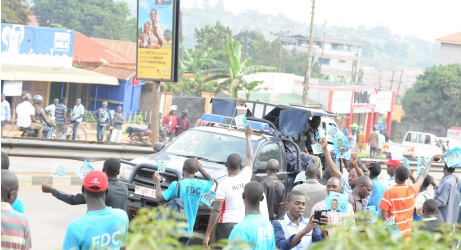
Crime preventers introduced and adopted the ‘Mayumba Kumi’ concept where every ten households are assigned to a crime preventer. Their role was to carry out intelligence gathering; know new entrants in the village, keep tabs on them and report back to higher up which is police structures.
MP Mathias Mpuuga commented on the crime preventers at the time that “the whole issue is politically vulgar and is not fit to be part our polity.”
“It is not properly oriented into what is aimed at doing – community policing,” he told The Independent.
Mpuuga said the main issue with crime preventers was that they were not seconded by the community they serve but were instead being seconded for recruitment by the NRM-government machinery, which includes the District Internal Security Officer (DISO) and operatives of the Internal Security Organisation (ISO).
The group came in handy for Kayihura who had made a grand plan of thwarting the presidential campaign of former Prime Minister Amama Mbabazi in 2016. But after the election, the tables would start shifting.
Word started doing the rounds that Kayihura was using crime preventers to build a base for presidential ambitions. By the end of his tenure, CMI, ISO and the army in general had bounced back to the top of Uganda’s security architecture as Kayihura’s allies in Boda Boda 2010, and his senior commanders in Police were being detained and slapped with a string of charges.
Sanctions
In 2019, Gen. Kayihura was sanctioned by the U.S. allegedly for his role in the torture of Museveni’s opponents as Inspector General of Police (IGP) for 12 years. The sanctions statement read:
“Flying Squad Unit members reportedly used sticks and rifle butts to abuse NSIC detainees and officers at NSIC are accused of having beaten one of the detainees with blunt instruments to the point that he lost consciousness. Detainees also reported that after being subjected to the abuse they were offered significant sums of money if they confessed to their involvement in a crime.”
The Nalufenya police station in Jinja became a notorious torture dungeon where suspects were tortured to confess crimes they did not commit. The torture methods included knocking out kneecaps, removing nails, starvation of inmates and grievous body harm with blunt objects.
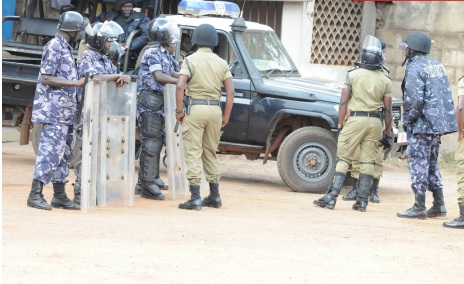
Much as Kayihura had already left the police, the sanctions were a reminder that police brutality under him was very much on record. Since the US sanctions, Kayihura has juggled charges in Ugandan courts and international scrutiny on him much as the charges will not stand in the way of what is set to be a colourful retirement ceremony for him and other Generals.
Kayihura was sanctioned under the Global Magnitsky Human Rights Accountability Act of 2016. Under this law, the U.S. says it seeks to “impose tangible and significant consequences on those who commit serious human rights abuse or engage in corruption”.
The charge stated that Kayihura engaged in numerous acts of corruption; including using bribery to strengthen his political position within the Government of Uganda, stealing funds intended for official Ugandan government business, and using another government employee to smuggle illicit goods, including drugs, gold, and wildlife, out of Uganda.
“We are targeting Uganda’s former Police Inspector General Kale Kayihura for using corruption and bribery to strengthen his political position, as units under his command committed serious human rights abuses,” said Sigal Mandelker, Treasury Under Secretary for Terrorism and Financial Intelligence in 2019. “The U.S. government is committed to leveraging our human rights and corruption authorities to target, disrupt, and counter those who engage in abuse and corruption around the world.”
Before being appointed IGP, Kayihura was the commandant of the Special Revenue Protection Service, which was the anti-smuggling unit of the Uganda Revenue Authority (URA).
It is from here that President Museveni noticed that his former military assistant could take on a career-defining role that would ultimately entrench Museveni’s rule in Uganda for years to come.
 The Independent Uganda: You get the Truth we Pay the Price
The Independent Uganda: You get the Truth we Pay the Price




This man was betrayed by M7. He was being harassed by his colleagues for tightly controlling funds which they wanted to steal hence the framing of charges against him. More people died in the first three years of Ochola than during the 12 years of Kayihura. He was a negotiator and sympathised with the public by using teargas instead of live bullets like his colleagues who killed more than 50 people on one day in the 2021 elections…just because they wanted to look different from him. If it was Kale’s time all those guys would have returned to their homes because he only used teargas. Gen. Kale you are dearly missed by people who can do the analysis.